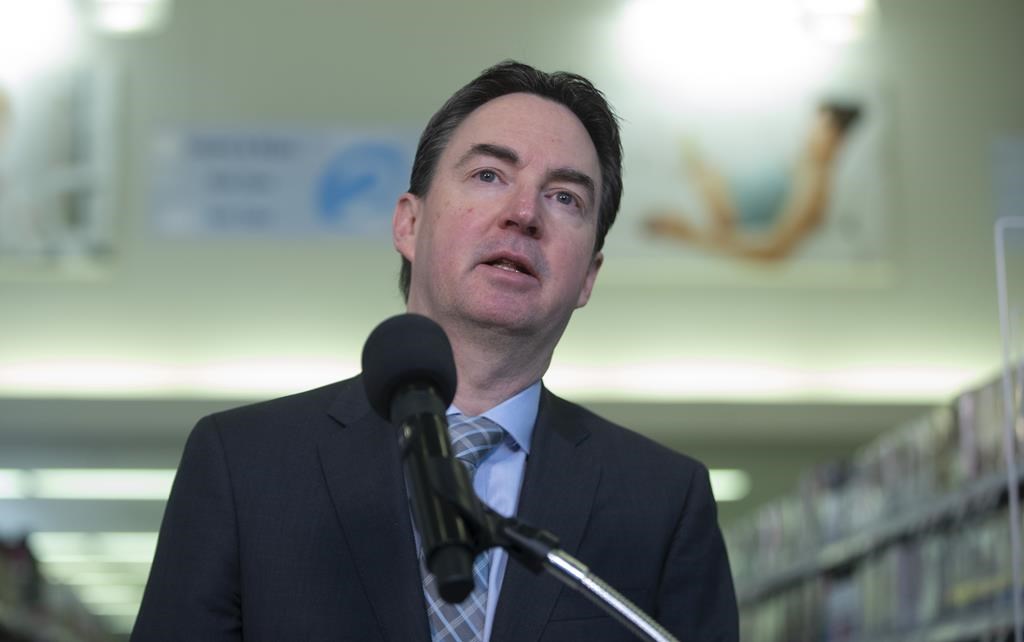Alberta budget to include $2B for primary healthcare

Alberta Health Minister Jason Copping says if the province’s 2023 budget proposal is passed, $2 billion would go toward improving primary healthcare.
This includes $243 million over three years to “strengthen the primary care system” throughout Alberta and to make it easier to access a family doctor, he announced Tuesday.
Copping says there will also be funding for Primary Care Networks (PCN) and paying family doctors, funding to “strengthen and modernize primary health care,” and investments in community-based physicians.
Advertisement
In addition, the minister explains money is being earmarked to support the work of Modernizing Alberta’s Primary Care System (MAPS) — an initiative meant to advise the province.
Recommendations from MAPS come from advisory and Indigenous panels, which were established in the fall of 2022 to “identify primary health care improvements” and to “investigate complaints of racism while accessing the delivery of health care.” The panels are to provide advice over the next 10 years.
Related Video
“This is, from my perspective, one of the most significant pieces of work our government is doing in the healthcare space, looking at reinvesting in primary care,” Copping told reporters Tuesday.
“We can react to and be there for when people need it. But if we keep people out of the system, [and] focus on prevention, primary care, community-based care, and home-based care, that will actually reduce demand on our acute care system and result in better health care outcomes.”
Primary health care is the first point of contact Albertans have with the health system and includes family doctors, nurse practitioners, pharmacists, and public health nurses.
Advertisement
Speaking to the Alberta Recovery Capital Conference on Tuesday, Premier Danielle Smith also said $275 million would be invested in mental health and addiction services in the province if the budget passes.
“This record-breaking investment would be used to focus on key priorities, including increasing our harm reduction programs and helping our partners further increase access to treatment and recovery supports,” Smith said in her speech at the Hyatt Regency in downtown Calgary.
Indigenous health a priority in budget: Siksika Nation doctor
Dr. Tyler White, the CEO of Siksika Health Services and the co-chair of the MAPS Indigenous advisory panel, says the panel plays a role in ensuring “Indigenous people have access to high quality, culturally safe primary health care services.”
He explains Indigenous communities are struggling with accessing primary health care, adding the life expectancy of Indigenous people in Alberta is comparable to that of Calgarians during the 1930s.
White says this is 18.2 years below the life expectancy of non-Indigenous Albertans.
Advertisement
“We’ve also seen an increase in rates of diabetes, cancer, mental health issues, and drug misuse among Indigenous communities. Rates of self-harm resulting in emergency department visits amongst First Nation youth ages 10 to 12 are four times higher than non-First Nations youth,” White said.
“This is evidence that change is required, and the time to act is now.”
The remarks come after Canada’s premiers and the federal government came to an agreement on health funding. However, Copping says the recent agreement did not factor into the budget.
“We are committing to this, regardless of whether we got an agreement or not, because this is important and it’s a focus of our government,” Copping said.
“The federal government is also separately putting an investment into Indigenous health, which is … great. And I’m looking forward to working with them to get additional funding so we can move faster in terms of our transformation and be able to provide support to Albertans and Indigenous peoples.”
Advertisement
Related Stories:
-
Alberta NDP to consult people about healthcare
-
Provinces agree to accept new federal health funding offer
-
How will $46B in more funding impact Canada’s health-care system?
If the budget passes, $125 million would be used for “implementing recommendations” from MAPS and $40 million for PCNs under the Alberta Medical Association agreements.
Additionally, $27 million would go to PCNs to help with an increase in patients attached to a primary care provider, while $12 million would be allocated to IT systems meant to “improve the continuity of care” in Alberta.
Copping says the MAPS panels will provide an update in the spring, and recommendations will be posted on the MAPS website.
With an election just months away, the Alberta NDP is promising one-stop locations for health and wellness providers, similar to the UCP. The New Democrats say they would determine the best way to incorporate primary care networks into that model if they win the next election, slated for this coming May.
